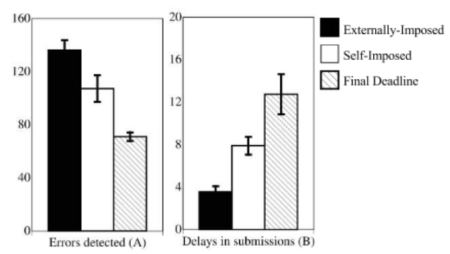
Photo by Hector Garcia
If you’re reading Priceonomics right now, you’re probably procrastinating. Maybe you have a project to finish. Or maybe you have a phone call to make. Either way, it’s probably not getting done anytime soon.
Everyone has their own strategies for fighting procrastination. They usually involve setting (and breaking) deadlines. According to a study from the Journal of Psychological Science, however, not all deadlines are created equal.
Psychologists Dan Ariely and Klaus Wertenbroch gave students three weeks to proofread three dense passages. The first group of students only had one final deadline — they had to submit all the edits within 3 weeks. The second group set their own deadlines for each of the three passages. For the final group, Ariely and Wertenbroch imposed evenly spaced deadlines for each passage.
How did each of these groups fare? The externally-imposed deadlines group did best:

Source: Duke University
Not only did externally-imposed deadlines lead to fewer delays in submissions, but they also resulted in better proofreading. Meanwhile, students who set their own deadlines performed better than the group with only a final deadline. The authors explain it this way:
“People have self-control problems, they recognize them, and they try to control them by self-imposing (meaningful) deadlines. These deadlines help people control procrastination, but they are not as effective as some externally-imposed deadlines in improving task performance. […] Do people set their own deadlines optimally, for maximum performance enhancement? No.”
The results of this study could be more compelling — and would be more universal — if it wasn’t looking at just students performing a boring task. But if you have to get something done, having multiple deadlines along the way seems to be effective. And working under an imposed schedule is even more productive.
To get occasional notifications when we write blog posts, sign up for our email list.



